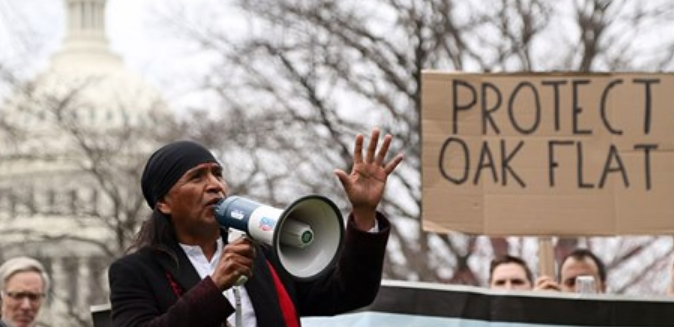
- Details
- By Native News Online Staff
TUCSON, Ariz. — Even though it appeared as if President Donald Trump refused to acknowledge he lost the 2020 presidential election to President-elect Joe Biden, those in the Trump administration knew their days in power were numbered. And since the election they have rushed to fast-track some of their mining projects that American Indians oppose.
One is the Oak Flat project, which will transfer 2,500 acres that several southwest tribes consider sacred and utilize for ceremonial purposes. The Trump administration’s USDA Forest Service seeks to transfer Oak Flat, or Chi'chil Bildagoteel, to British-Australian corporate mining giant Rio Tinto and its subsidiary, Resolution Copper, by Jan. 15, five days before Biden will be sworn in as president.
Apache Stronghold, on behalf of traditional Apache religious and cultural leaders, sued the Trump administration on Tuesday in U.S. District Court in Phoenix to stop the transfer.
The lawsuit seeks to stop the U.S. Forest Service’s publication on Jan. 15 of a final environmental impact statement that will trigger the transfer of Oak Flat to Resolution Copper.
“Oak Flat is holy and sacred. Chi'chil Bildagoteel is central to our traditional religion and identity as Apache people,” former San Carlos Apache tribal chairman and Apache Stronghold leader Dr. Wendsler Nosie Sr. said. “Giving away our sacred land by the U.S. Government for destruction by a foreign mining company destroys our ability to practice our religion. It violates our First Amendment right to the free exercise of our religion protected by the Constitution.”
The San Carlos Apache Tribe, White Mountain Apache Tribe and hundreds of other Native American tribes oppose the transfer.
Tuesday's lawsuit against the U.S. government says the giveaway and destruction of Oak Flat violates the Religious Freedom Restoration Act and Apaches’ constitutional rights to religious freedom, due process, and petition and remedy. The giveaway also constitutes a breach of trust and fiduciary duties, the lawsuit says.
In December 2014, after being thwarted for nearly a decade, Arizona Republican Sen. John McCain, along with U.S. Reps. Ann Kirkpatrick (D-Ariz.) and Paul Gosar (R-Ariz.), attached a legislative rider to the 2015 Defense Department funding bill giving away Oak Flat to Resolution Copper.
Oak Flat is located about 70 miles east of Phoenix on the Tonto National Forest on lands historically shared by multiple tribes including the Apache, the Yavapai, the Pee-Posh and the O'odham. Prior to the rider, Oak Flat has been protected from mining since 1955, when President Eisenhower protected the area for its cultural and environmental value. Rio Tinto admits that their Oak Flat mining will create a crater almost two miles across and more than 1,000 feet deep. Oak Flat will be destroyed.
“Mining corporations from other countries want to destroy our holy land, destroy our religious beliefs and destroy our religious freedom,” said Apache Stronghold member Naelyn Pike. “Oak Flat, or Chi'chil Bildagoteel, is a God-given gift that our creator has given to us for sacred purposes and it must be protected for that reason.”
More Stories Like This
NCAI Passes Two Emergency Resolutions on Immigration Enforcement ActivitiesChickasaw Lighthorse Police Officer named Indian Country Law Enforcement Officer of the Year
Indian Gaming Association Rallies Broad Coalition Against Sports Event Contracts It Calls Illegal Threat to Tribal Sovereignty
Navajo Resources and Development Committee Issues Notice on Livestock Inspection Requirements
American Prairie, Tribal Coalition Files Protest Over Rescinded Grazing Rights
Help us defend tribal sovereignty.
At Native News Online, our mission is rooted in telling the stories that strengthen sovereignty and uplift Indigenous voices — not just at year’s end, but every single day.
Because of your generosity last year, we were able to keep our reporters on the ground in tribal communities, at national gatherings and in the halls of Congress — covering the issues that matter most to Indian Country: sovereignty, culture, education, health and economic opportunity.
That support sustained us through a tough year in 2025. Now, as we look to the year ahead, we need your help right now to ensure warrior journalism remains strong — reporting that defends tribal sovereignty, amplifies Native truth, and holds power accountable.
 The stakes couldn't be higher. Your support keeps Native voices heard, Native stories told and Native sovereignty defended.
The stakes couldn't be higher. Your support keeps Native voices heard, Native stories told and Native sovereignty defended.
Stand with Warrior Journalism today.
Levi Rickert (Potawatomi), Editor & Publisher

